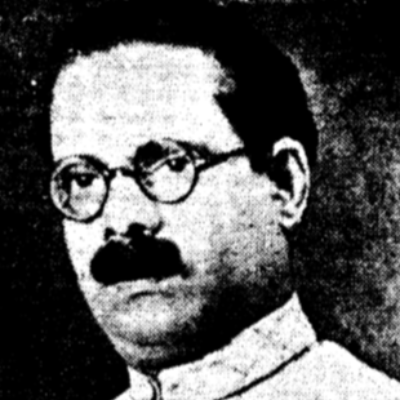Bharatidasan

Subscribe to read full article
This section is for paid subscribers only. Our subscription is only $37/- for one full year.
You get unlimited access to all paid section and features on the website with this subscription.
Not ready for a full subscription?
You can access this article for $2 , and have it saved to your account for one year.
- Real Name: Kanagasabai Subburatnam
- Born: 29 April 1891 (Pondicherry)
- Died: 21 April 1964
- Primary Cinema: Tamil
- Parents: Kanakasabai Mudaliar, Ilakumi Ammal
- Spouse: Palani Ammayar
- Children: Mannarmannan, Saraswati, Vasantha, Ramani
A legendary poet, scenarist, dialogue writer and activist, Bharathidasan is widely regarded as one of the most important figures in the history of Tamil literature. Initially influenced by Gandhi, he would later become a follower of Periyar and his writings would influence the Dravida Munnetra Kazhagham movement. As a dialogue writer and lyricist in Tamil cinema, he enjoyed great success in the 40s.
Born on 29 April 1891 in Pondicherry as Kanagasabai Subburatnam, he displayed a proclivity towards the Tamil language from a very young age. Although educated at a French school, his interest in Tamil literature would take him to the Kalve College in Pondicherry. Displaying immense merit, he stood first in his discipline and was later appointed as the Tamil teacher at the Government College, Karaikal. He considered the poet Subramanya Bharati as his spiritual mentor and after befriending him, adopted the name Bharatidasan which meant 'disciple of Bharati'.
Initially composing many religious poems and being involved with the freedom movement, his turn towards atheism and rationalism signalled a shift in his writing. He laos joined the Dravidar Kazhagham and became engaeged in the Dravidian movement with Periyar. Some major themes of his writing were his stringent opposition to Brahminical orthodoxy, anti-casteism and resistance to North Indian hegemony. Periyar conferred on him the title of Puratchi Kavingyar or Revolutionary Poet. He was the recipient of the Golden Parrot prize for his play Amaithi-Oomai and the Sahitya Akademi Award for Pisiranthaiyar in 1970.
In 1937 he made his film debut with P V Rao's Balamani. He became associated with Modern Theatres after working in Ellis Duncan's Kalamegham in 1940. Apoorva Chintamani (1947) proved to be a major breakthrough for him. His dialogues for Ponmudi (1949) were also highly appreciated. He wrote lyrics for Valayapathi (1952). Several of his poems have featured in films.
On MGR's encouragemnt he became an elected member of the Pondicherry legislative assembly in 1954.
The legendary poet passed away on 21 April, 1964. In 2001 the Chennai Post Office issued a commemoratve stamp in his honour.







.jpg)



